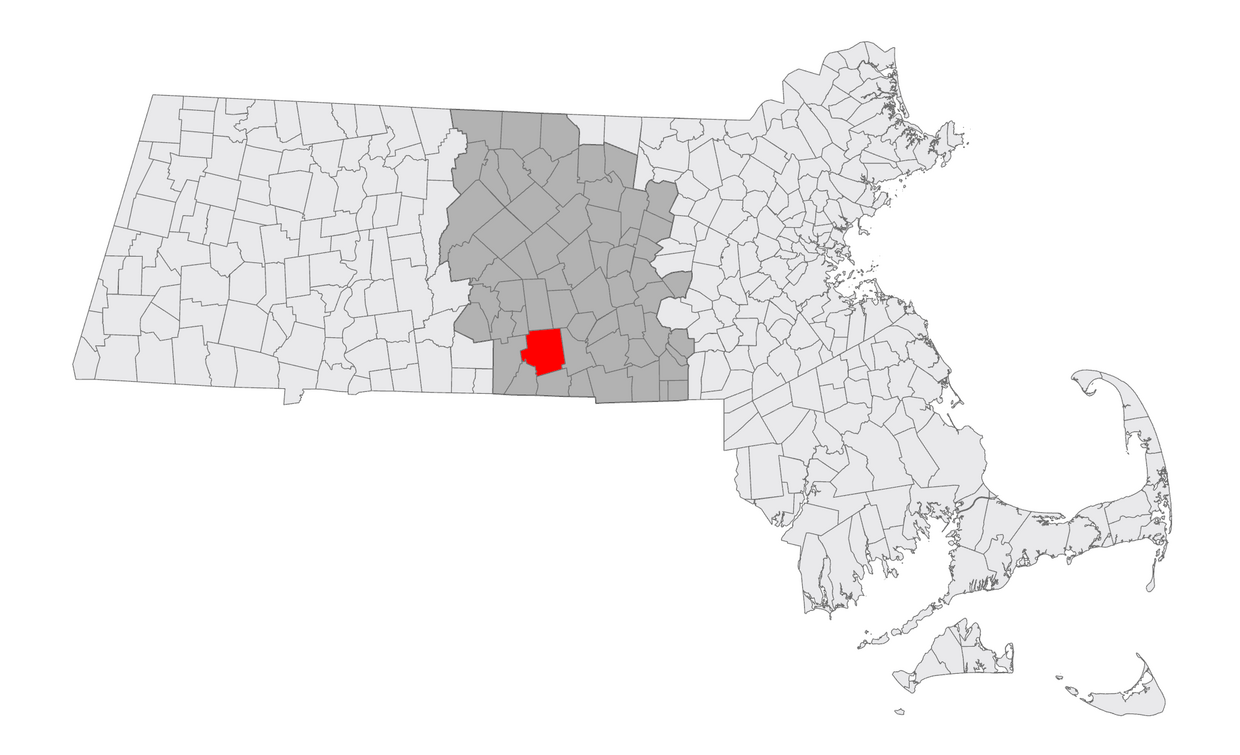Charlton Overview
Charlton is a town in Worcester County, Massachusetts, in the central part of the state. They have a population of 13,317 people and an area of 42.2 square miles. Climate hazards present in Charlton include inland flooding, severe weather, severe winter storms, drought, and extreme temperatures.
Charlton's MVP 2.0 Core Team
The MVP 2.0 Core team is a group of municipal staff and Community Liaisons who work together to identify local climate resilience priorities and implement a project that supports those priorities.
Charlton's Community Liaisons include representation from:
- Nipmuck tribal community
- Town Farm
- Local food pantry
Charlton's Core Team municipal representation includes individuals from:
- Conservation Commission
- Planning Department
- Board of Health
Charlton's Community Resilience Priorities
Community resilience priorities are actionable steps that were developed as part of the MVP 2.0 Planning Grant process. They are a result of dedicated community engagement, reflection on the evolving nature of community needs, and input from Environmental Justice and priority populations.
| Priorities | Potential Actions | ||
|---|---|---|---|
| Priority 1: Promote landscape-scale land protection focused on riparian lands, upland forests, and habitat resiliency. | Potential Actions: To be determined. | ||
| Priority 2: Support wastewater infrastructure in town by expanding the town sewer and updating aging and failing septic systems to improve water quality, and incorporate best practices to better withstand climate impacts. | Potential Actions: To be determined. | ||
| Priority 3: Protect critical transportation routes to schools, healthcare facilities, and essential workplaces through targeted flood resilience projects, prioritizing improved infrastructure along flood-prone corridors to ensure all-weather access for educators, care workers, and students. | Potential Actions: Create an inventory of all road-stream crossing structures (i.e., bridges and culverts) in town and prioritize for replacement, based on conservation benefits, minimizing flood risk, community benefit and maintenance costs., re-establish connectivity and more natural flows along our rivers and streams by removing or modifying existing structural impediments, such as dams, and culverts, modify upstream flood control and water management infrastructure and the operation thereof to allow for regular flooding of floodplain forests where feasible. | ||
| Priority 4: Develop ways to make housing more affordable, especially for seniors, people with disabilities, and lower-income residents. | Potential Actions: Actions could include hiring a regional housing coordinator, providing financial assistance through a housing trust, ensure housing options are safe, up to code, and universally accessible, provide assistance to allow residents to age in place, increasing access to affordable energy efficient heating and cooling systems, particularly in the building rehab program with a specific focus on retrofits for rental properties and informational campaigns about existing energy efficiency programs Develop a funding source and/or policies to provide low-income/fixed-income/elderly with $ to prevent power companies from shutting off services to their customers due to nonpayment of bills during extreme heat or cold events (opposite of fuel/heating assistance). | ||
| Priority 5: Work with the library and COA to develop and host monthly “cafes” to provide a safe space for residents to discuss sensitive issues, especially prevalent in the over-65 community. | Potential Actions: Actions could include “Rainbow Cafes” to provide a safe space for LQBTQIA to gather and discuss community issues, “Memory Cafes” to provide a safe space for residents experiencing cognitive challenges along with caring family members, friends and professional caregivers with find meaningful programming, friendship, and acceptance. | ||
| Priority 6: Encourage preservation of small, sustainable, diverse, community supported farms to secure the ecosystem services these lands provide while educating the public about the importance of local agricultural systems. | Potential Actions: To be determined | ||
| Priority 7: Manage or retrofit municipal properties to reduce heat impacts felt within the community. | Potential Actions: To be determined | ||
| Priority 8: Review potable water vulnerabilities in both private wells and public water supply systems across the community. | Potential Actions: Actions could include encouraging private well owners with vulnerable well locations to seal well and to grout the space between the casing and bore hole and/or relocate the well on the property. Develop GIS database of private wells or parcels with wells. Track and communicate incidences of private water well failures with health departments especially in drought conditions. Encourage residents to sample their wells on an annual basis, especially following significant storm events. Encourage private well owners extend well casing above flood level if in a delineated FEMA flood zone or commonly known flooding area even if above 1ft above grade. Research possibility of solar-powered or hand-powered pumps for residents/facilities dependent on potable well water. Well depth will determine feasibility of different technologies. | ||
| Priority 9: Review and address existing shelter and transportation plans for vulnerable populations during hazardous and disaster events. | Potential Actions: Actions could include identifying shelter locations outside of flood plains; explore “pet friendly” shelters, prepare for additional trauma due to dispossession, mental health challenges and post-traumatic stress disorder and ensure have mental health providers are staffed at shelters during the aftermath of extreme events, and working with emergency responders to develop these plans. | ||
| Priority 10: Explore options to expand public transit services in transit isolated areas by collaborating with the WRTA and assessing the feasibility of adding a bus shuttle. | Potential Actions: Actions could include adding more bus stops, increasing frequency of buses, and conducting a feasibility study for a bus shuttle. | ||
Charlton's MVP 2.0 Seed Project: Resilient Town Forest Policy and Forest Management Plan for 100 acres off Colburn Road
Charlton received funding to implement a Seed Project that addresses one or more of their climate resilience priorities.
The activities of this project include:
- Conduct a natural resource inventory of municipal forested land.
- Hire specialist (licensed forester/ecological consultant) to create a forest management framework.
- Draft a town forest policy with guidance from regional conservation and planning experts.
- Hold forums with stakeholders including residents, EJ populations and tribal representatives.
- Build staff/volunteer capacity on ecosystem-based forest stewardship.
Charlton's Action Grant Projects
The MVP Action Grant provides funding to communities that want to take important steps to prepare for climate change, such as dealing with extreme weather, flooding, rising sea levels, and extreme heat.
Integrated Water Infrastructure Vulnerability Assessment and Climate Resiliency Plan (FY18)
The Town of Charlton and the Town of Spencer conducted a comprehensive, regional climate change vulnerability assessment and climate resiliency plan that addressed water infrastructure in both communities. The results of these assessments, combined with input from a committee, will guide the development of an integrated climate resiliency plan.










